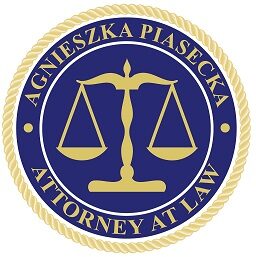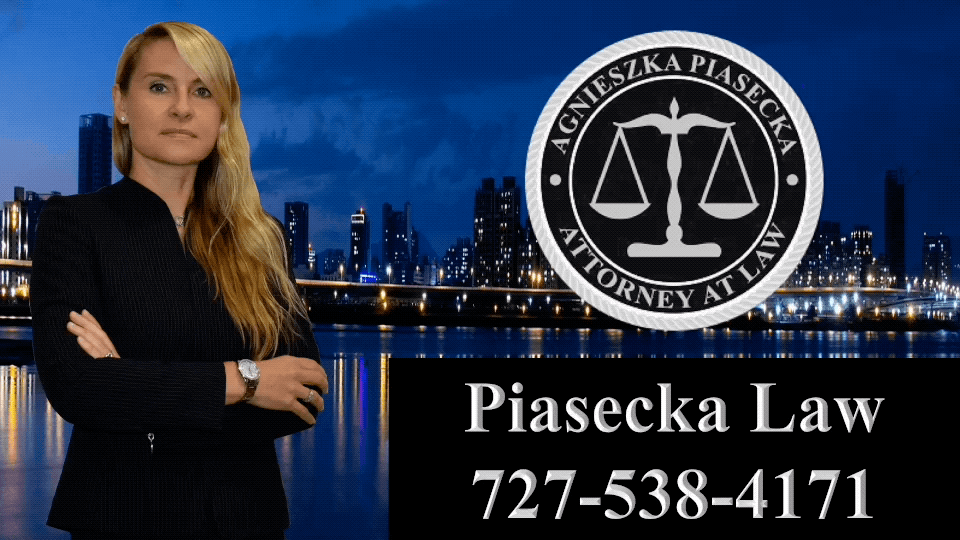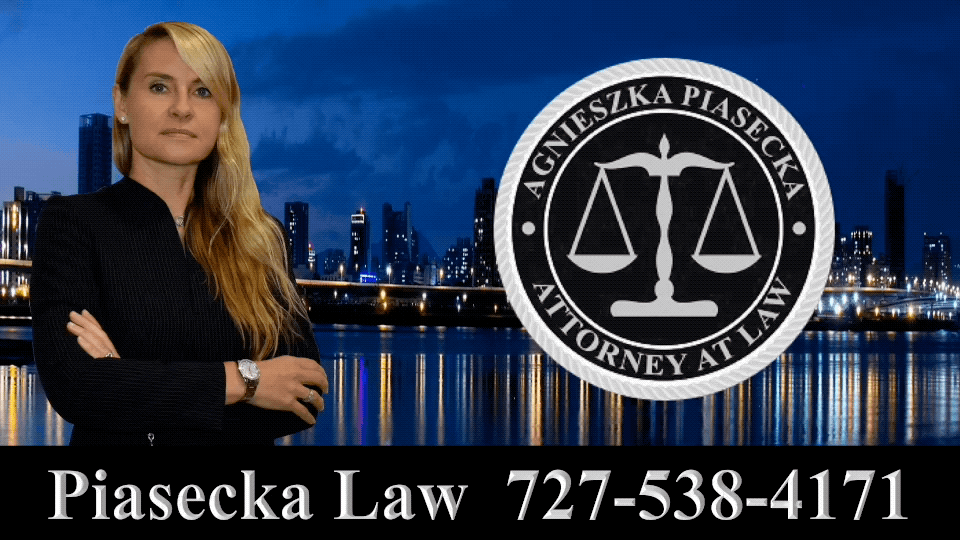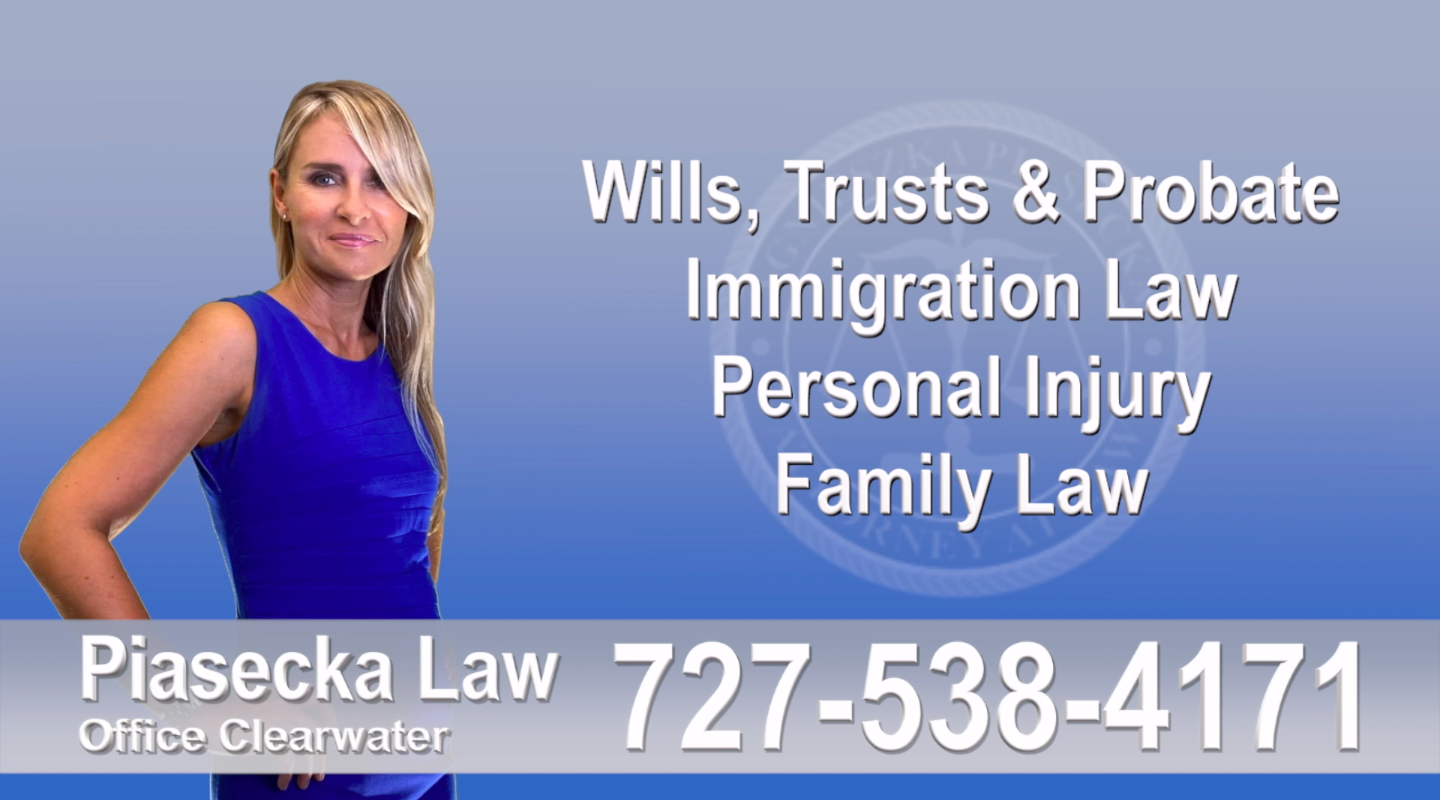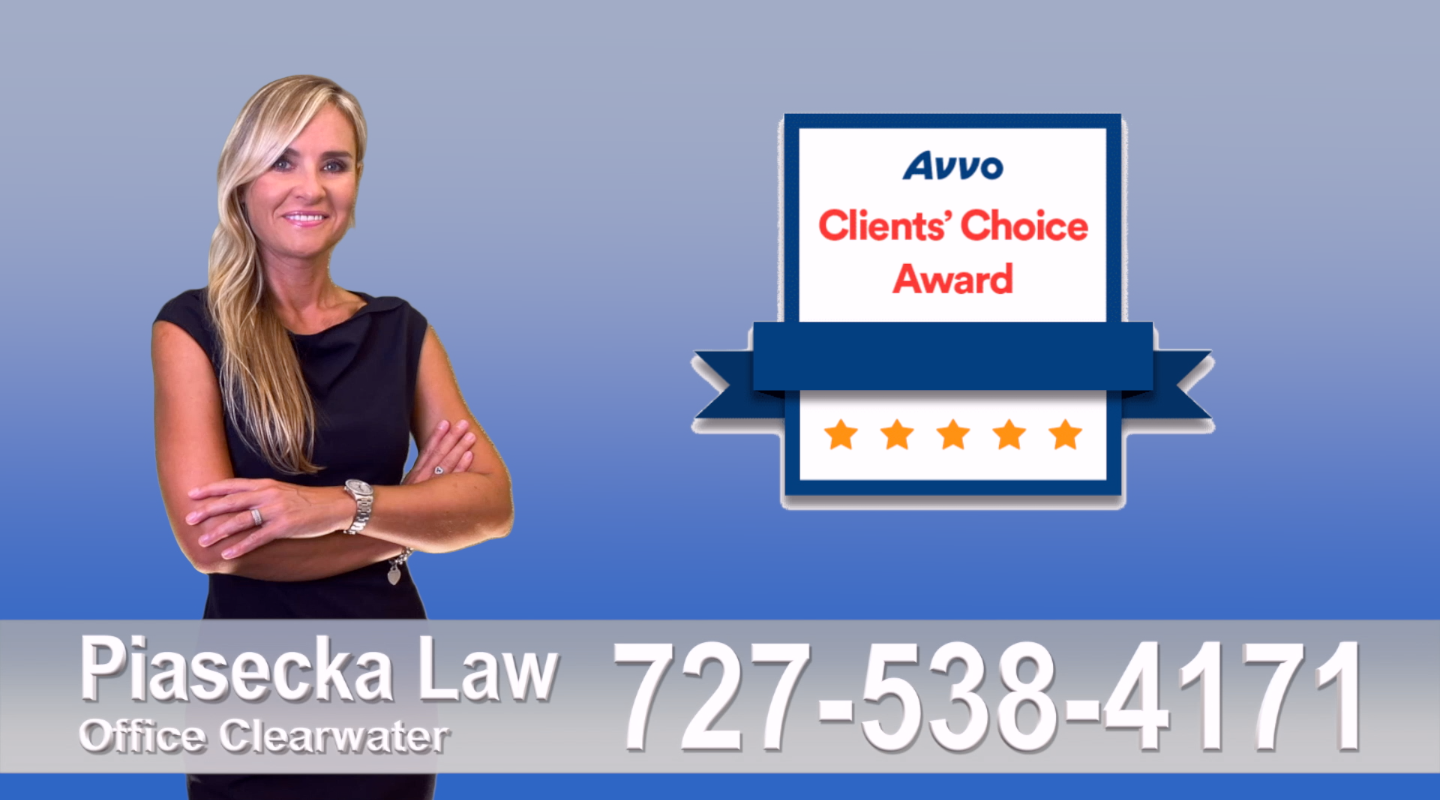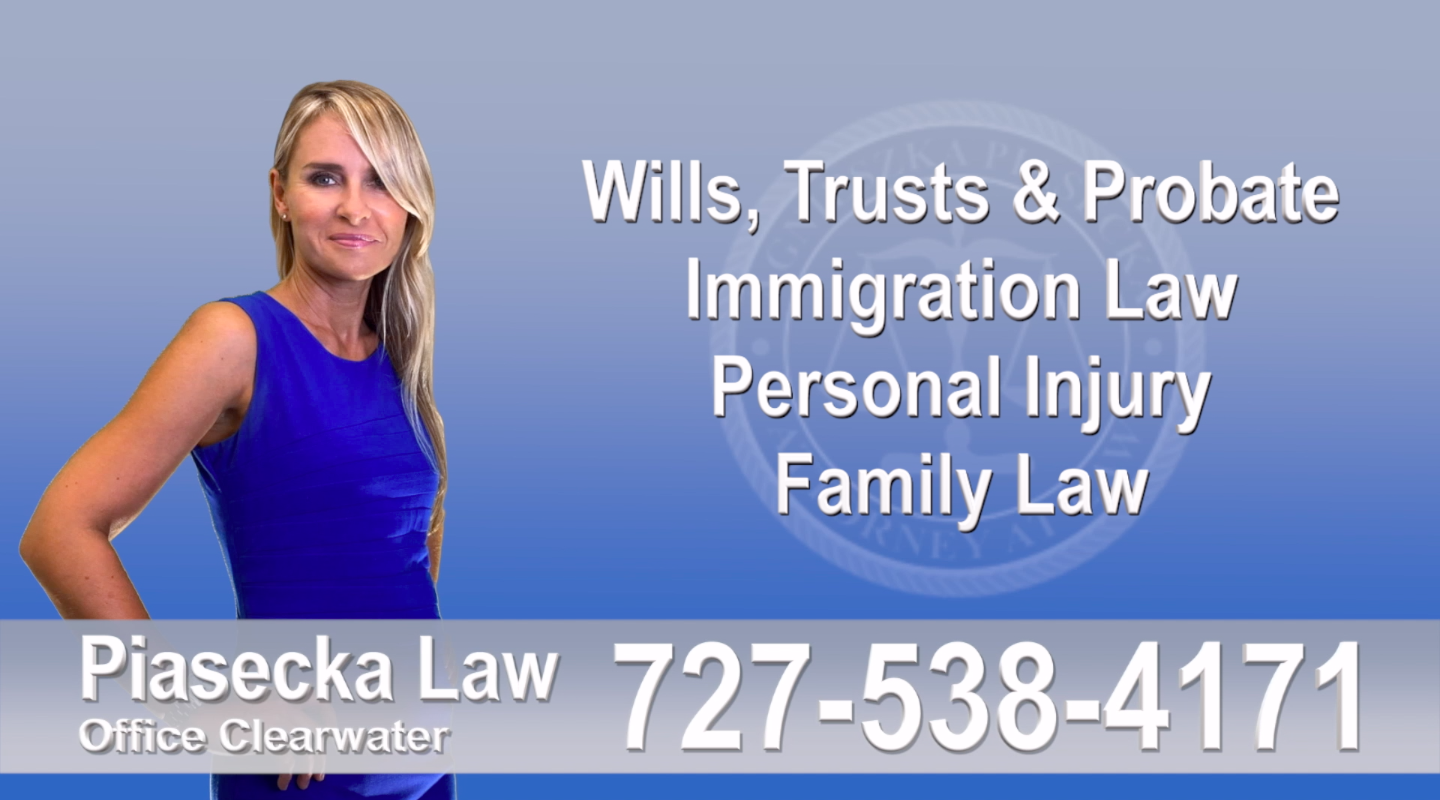For a free consultation please call / W sprawie darmowej konsultacji zadzwoń na:
813-786-3911
727-538-4171
Agnieszka “Aga” Piasecka jest polskim prawnikiem na Florydzie. Adwokat Agnieszka Piasecka ma ponad 20 lat doświadczenia prawniczego oraz uprawnienia do praktyki prawa na Florydzie i w Polsce. Adwokat, Agnieszka Piasecka, może pomóc Ci między innymi w: sprawach rodzinnych, rozwodowych, imigracyjnych, spadkowych (testamenty i trusty), wypadkach, odszkodowaniach, mandatach drogowych, w sprawach nieruchomosci, jak również w przygotowaniu i interpretacji kontraktów i dokumentów biznesowych. Adwokat Agnieszka Piasecka ma również uprawnienia notarialne na Florydzie i może notaryzować dokumenty osobiście lub online oraz pomóc w załatwieniu certyfikacji apostille. Pierwsza konsultacja jest bezpłatna!
Agnieszka Piasecka offers flat rates on creation of Trusts and Wills, Living Wills, Deeds and Powers of Attorney.
For a FREE CONSULTATION, call Agnieszka Piasecka at:
727-538-4171
813-786-3911
Adwokat Agnieszka Piasecka może pomóc Ci sporządzić:
- Testament
- Trust
- Dyrektywy medyczne na wypadek ciężkiej choroby
- Pełnomocnictwo
- Pełnomocnictwo do podejmowania decyzji medycznych
Testament czy Trust – jak najkorzystniej rozporządzić majątkiem na wypadek śmierci?
Co to jest „trust”?
W dużym uproszczeniu, według prawa Florydy, trust to twór prawa, poprzez który można skutecznie rozporządzić majątkiem na wypadek śmierci omijając postępowanie spadkowe. Dokument ustanawiający trust, tzw. „Trust Agreement” lub „Trust Insturment” stanowi deklarację intencji utworzenia trustu i przeniesienia określonego majątku z osoby fizycznej, założyciela (spadkodawcę), tzw. „Settlor”, na trust pod pieczę zarządcy, tzw. „Trustee”, na korzyść beneficjariusza/y, tzw. „Beneficiary”, czyli osoby wyznaczonej do dziedziczenia majątku. W przypadku zwykłych trustów, mających na celu rozporządzenie majątkiem na wypadek śmierci i uniknięcie postępowania spadkowego, założyciel i zarządca trustu to zwykle najczęściej ta sama osoba, która w czasie życia ma pełną kontrolę nad majątkiem przeniesionym do trustu jak i nad dokumentem ustanawiającym trust. Trust może być w każdej chwili zmieniony lub odwołany. Po śmierci założyciela trustu, majątek trustowy przechodzi na beneficjariusza/y bez postępowania spadkowego.
Co to jest postępowanie spadkowe i czy jest ono konieczne aby otrzymać spadek?
Postępowanie spadkowe to process sądowy, w którym majątek zmarłego przechodzi oficjalnie na spadkobierców. Sądy Florydy są właściwe do rozstrzygania spraw spadkowych jeżeli zmarły w chwili śmierci był rezydentem Florydy lub pozostawił na Florydzie nieruchomości. Postępowanie spadkowe na Florydzie, tzw. „Probate Proceedings” jest najczęściej konieczne, jeżeli zmarły pozostawił po sobie majątek, który podlega postępowaniu spadkowemu. Jeżeli zmarły pozostawił testament, musi on być złożony w sądzie w ciągu 10 dni od momentu odkrycia testamentu. Jeżeli nie było testamentu, to należy złożyć wniosek o otwarcie postępowania spadkowego, w którym dziedziczenie odbywa się z mocy ustawy. Postępowanie spadkowe na Florydzie jest długotrwałe i kosztowne. W zależności od wielu czynników, postępowanie spadkowe może trwać od kilku miesięcy do nawet kilku lat i może kosztować do kilku procent wartości majątku spadkowego. Postępowanie spadkowe jest skomplikowanym procesem wymagającym zatrudnienia adwokata co dodatkowo zwiększa jego koszty. W czasie postępowania spadkowego, majątek spadkowy jest „zamrożony” i niedostępny dla spadkobierców.
Jakie są formalności potrzebne do ustanowienia testamentu oraz trustu?
Generalnie oba dokumenty muszą spełniać szereg wymogów formalnych aby były ważne z mocy prawa. Jeden z głównych wymogów formalnych to konieczność własnoręcznego podpisania dokumentu w obecności dwóch świadków. Podczas gdy testament to zwykle jeden niezbyt długi dokument, do ustanowienia trustu potrzebny jest na ogół pakiet dokumentów i obejmuje od kilkunastu do kikudziesięciu stron. Nieprawidłowo sporządzony lub podpisany testament lub trust jest nieważny, dlatego bardzo istotne jest skonsultowanie się z doświadczonym prawnikiem w celu odpowiedniego profesjonalnego przygotowania dokumentu i dopełnienia wszystkich formalności związanych z podpisaniem dokumentu.
Co stanie się jeżeli w ogóle nie rozporządzę majątkiem po śmierci?
Generalnie, w przypadku, gdy zmarły pozostawił majątek, którym nie rozporządził nim za życia, majątek ten podlega postępowaniu spadkowemu, a spadkobiercy dziedziczą z mocy ustawy. O podziale majątku po śmierci decyduje zatem sąd. Może to mieć szczególnie znaczenie, jeżeli zmarły pozostawił krewnych, co do których nie chciał, aby po nim dziedziczyli. Jeżeli zmarły nie pozostawił spadkobierców, wówczas majątek przejmuje państwo. Jakkolwiek, jeżeli zmarły był w związku małżeńskim i posiadał majątek małżeński w formie wspólności małżeńskiej (tzw. „tenancy by the entirety”), wówczas jego małżonek przejmuje majątek małżeński bez postępowania spadkowego.
Jakie są korzyści ustanowienia trustu?
1. Ominięcie postępowania spadkowego. Główną zaletą trustu sporządzonego w celu rozporządzenia majątkiem po śmierci, jest fakt, że trust nie podlega sądowemu postępowaniu spadkowemu. Jak wspominałam wcześniej w pierwszej części artykułu (wydanie czerwcowe), postępowanie spadkowe bywa bardzo drogie i długotrwałe. Koszty postępowania spadkowego mogą wynieść nawet do kilku procent wartości spadku, natomiast czas trwania postępowania spadkowego to co najmniej kilka miesięcy.
2. Prywatność. W pierwszej części artykułu nadmieniłam o tym, że testament po śmierci testatora musi być złożony w sądzie przez co staje się dokumentem publicznym. Wymagania te nie dotyczą trustu, tak więc po śmierci założyciela trustu wszelkie dane o jego majątku i długach pozostają na zawsze prywatne. Osoba dziedzicząca przez trust musi po śmierci założyciela trustu złożyć w sądzie tylko jeden krótki dokument, tzw. zawiadomienie o truscie, w którym nie ujawnia treści dokumentu acz tylko informuje potencjalnych kredytorów o istnieniu trustu.
3. Trudniej jest podważyć ważność trustu. Jeżeli planujesz wydziedziczyć potencjalnych spadkobierców, ustanowienie trustu może być dla Ciebie lepszą opcją ponieważ dokument ten jest prywatny i nie składa się go w sądzie po śmierci spadkodawcy. Trudniej jest również podważyć w sądzie ważność profesjonalnie sporządzonego trustu niż testamentu. Wielu ludzi decyduje się zatem na sporządzenie trustu zamiast testamentu aby uniknąć w przyszłości sporów sądowych, które mogłyby doprowadzić do jego obalenia.
4. Uniknięcie postępowania spadkowego w innych stanach. Jeżeli posiadasz nieruchomości poza stanem Floryda, możesz uniknąć wysokich kosztów postępowania spadkowego w innym stanie poprzez zawarcie tych nieruchomości w truscie.
5. Korzyści podatkowe. Ustanowienie trustu ma również korzyści podatkowe w przypadku większych majątków przekraczających $ 5.45 milionów dolarów.
6. Trusty wyspecjalizowane. Istnieje wiele rodzajów trustów wyspecjalizowanych, które poza uniknięciem postępowania spadkowego, mogą służyć również innym celom np. trusty dla sadkobierców niepełnosprawnych pobierającym benefity socjalne od państwa; trusty dla organizacji charytatywnych, trusty inwestycyjne wypłacające spadkobiercom określoną pensję w regularnych odstępach czasu bez przekazywania im całego majątku od razu, trusty dla zwierząt domowych, trusty służące zabezpieczeniu przed kredytorami, oraz wiele innych.
Jakie są wady ustanowienia trustu?
1. Wyższy koszt i bardziej skomplikowana procedura sporządzenia. Trust to skomplikowany dokument prawny, który powinien być przygotowany przez wykwalifikowanego prawnika. Sporządzenie trustu wymaga kompetecji i czasu, tak więc koszt przygotowania trustu jest wyższy niż koszt sporządzenia zwykłego testamentu. Dokument trustu może również odstraszać laików skomplikowaną treścią i dużą zawartością często niezrozumiałych terminów prawnych.
2. Formalne wymogi „zasilenia” trustu majątkiem poprzez przeniesienie tytułu własności. Do ważności trustu wymagane jest przepisanie tytułu własności pewnych składników majątku na trust. Dotyczy to między innymi np. nieruchomości oraz kont bankowych, w których należy zmienić tytuł własności na trust.
3. Zwykły trust nie chroni przed kredytorami. Istnieje mit, że aby uchronić się przed kredytorami, wystarczy ustanowić trust. W przypadku trustów, nad którymi założyciel trustu ma podczas swojego życia pełną kontrolę (poprzez możliwość zmiany i odwołania trustu) nie jest to prawda.
4. Postępowanie spadkowe może wciąż być konieczne co do niektórych składników majątku. Jeżeli w chwili śmierci zmarły pozostawił choć jeden składnik majątku poza trustem tzn. nie przepisał tytułu własności na trust, to postępowanie spadkowe może wciąż okazać się konieczne.
Jakie są korzyści ustanowienia testamentu?
1. Niski koszt przygotowania dokumentu. Sporządzenie prostego testamentu jest dużo tańsze niż ustanowienie trustu, tak więc początkowy koszt dla osoby zamierzającej rozporządzić swoim majątkiem po śmierci jest niższy.
2. Nieskomplikowany dokument. Jako dokument, testament jest w swojej formie o wiele prostszy niż trust i łatwiejszy do zrozumienia dla laika.
Jakie są wady ustanowienia testamentu?
1. Testament musi przejść przez kosztowne i długotrwałe postępowanie spadkowe. Jak wspomniałam powyżej, początkowo niski koszt sporządzenia testamentu, „przerzuca się” na spadkobierców, którzy po śmierci testatora będą musieli opłacić wysokie koszty postępowania spadkowego, koszty prawników oraz będą musieli odczekać minimum kilka miesięcy do nawet kilku lat do oficjalnego zakończenia postępowania spadkowego zanim otrzymają spadek.
2. Nieskomplikowany dokument. Jako dokument, testament jest w swojej formie o wiele prostszy niż trust i łatwiejszy do zrozumienia dla laika.
3. Testament jest dokumentem publicznym. Tak jak pisałam wcześniej, testament po śmierci zmarłego należy złożyć w sądzie w ciągu 10 dni od dnia śmierci. Od tego momentu treść testamentu staje się dokumentem publicznym, do którego każdy może mieć dostęp.
4. Łatwiej jest podważyć testament niż trust. W przypadku gdy spadkobiercy nie są zadowoleni z podziału majątku w testamencie mogą podjąć próbę podważenia ważności tego dokumentu w sądzie, co jest generalnie łatwiejsze w przypadku testamentu niż trustu.
Gdzie należy przechowywać oryginał dokumentu po jego sporządzeniu?
Oryginalny dokument testamentu lub trustu jest własnością osoby, która go sporządziła. Dokument ten należy przechowywać w miejscu, gdzie będzie on zabezpieczony przed zniszczeniem, pożarem, kradzieżą itp. Należy pamiętać, że fizyczne zniszczenie lub zagubienie oryginału testamentu może być równoważne z jego unieważnieniem, jeżeli nie zachowała się żadna kopia i brak jest świadków co do treści testamentu. Moim klientom polecam przechowywanie tych dokumentów w sejfie bankowym lub w pożaroodpornym sejfie w domu. O lokalizacji dokumentu należy powiadomić wykonawcę testamentu/beneficjariusza trustu aby w chwili śmierci mogli szybko uzyskać dostęp do dokumentu. Osoby, które zostały wydziedziczone nie powinny mieć dostępu do tych dokumentów.
Zadzwoń aby umówić się na BEZPŁATNĄ konsultację prawną:
(727) 538–4171 lub (813) 786–3911
Agnieszka “Aga” Piasecka, Esq. has experience with Estate Planning and Probate Law and can assist you with:
- Probate
Probate is a court-supervised legal process, through which the assets of a deceased person are identified and distributed to the heirs or beneficiaries under a will or, if there is no will, pursuant to Florida probate law. A will typically appoints a personal representative to administer the estate. If the deceased left no will and there are assets to be probated, the estate of the decedent must be distributed pursuant to probate law.
Generally, the decedent’s assets are identified and gathered and they are first used to pay the costs of probate proceedings, then to pay the decedent’s debts, and the remainder is distributed to the decedent’s beneficiaries.
There are two types of probate proceedings in Florida:
- A “Formal Administration”is filed when there are assets exceeding $ 75,000 and/or when it is necessary to appoint a representative to administer the estate.
- A “Summary Administration” is filed when the value of the entire estate subject to probate administration does not exceed $ 75,000 and the appointment of a personal representative is not necessary.
There is also a non-court supervised administration proceeding called “Disposition of Personal Property Without Administration”. This type of probate administration applies only to limited circumstances and may be filed via informal petition to request release of the decedent’s assets to reimburse the person who paid the final expenses such as e.g. funeral costs, medical bills etc.
Probate proceedings may be lengthy and very expensive. The duration of legal proceedings depends on many factors but in general it may take from a few months up to a few years to administer one’s estate. During this time the decedent’s assets remain “locked” in the court proceedings and unavailable to heirs and/or beneficiaries. The typical costs of probate proceedings may be as high as several percent of the estate’s value. Moreover, probate proceedings are public record, which means there is no privacy assured when your estate goes through probate. Therefore, it is important to plan ahead in order to avoid probate whenever possible.
- Last Will and Testament
A “last will”, also called “testament” is a written legal instrument, in which a person disposes of his or her property after death. Under Florida law, in order to be valid, a will must fulfill certain legal requirements. Wills must be validate by probate court in probate proceedings. After one’s death, a will must be admitted to probate court and go through probate proceedings. The custodian of the deceased’s original will, must file the will with the Clerk of the Court in the county where the decedent was domiciled, within 10 days after learning the person is deceased.
A will typically appoints a person to administer the deceased’s estate, so-called personal representative. If no personal representative has been named, it may be necessary for an attorney to file a petition with a court on behalf of the heirs, beneficiaries and other interested parties to a appoint a personal representative. Florida rules of law govern, who can become a personal representative and how will she or he be compensated.
- Living Wills
A “living will” is a written legal instrument stating a person’s desires regarding his or her medical treatment and/or end-of-life medical care in case of serious illness when they are no longer able to express informed consent and communicate their decisions to physicians and medical personnel. It is also called a “health care directive” or “advance directive”. A “living will” is different than a regular will, in which a person expresses their desires regarding distribution of their assets after death. Unlike a will, a “living will” has no power after one’s death.
A “living will” is a very important document, which can give doctors and family members invaluable guidance with making critical decisions as to a choice of medical treatment when a person becomes seriously ill and can no longer give informed consent and communicate their preferences.
- Health Care Directive
A “health care directive” also called “advance directive” to physicians is another name for a “living will”, in which a person states his or her desires regarding medical treatment preferences in case of serious illness, when they are no longer able to give informed consent and communicate their wishes.
- Advance Directive
An “advance directive” is another term for a “living will” or “advance directive”, which is a written legal instrument, in which a person states his or her desires and preferences regarding medical treatment in case of serious illness, when they are no longer able to give informed consent and communicate their decisions.
- Trusts
A “trust” is a legal arrangement regarding property, in which the creator of the trust (called Settlor) transfers ownership of assets into care of another person (called Trustee), who holds legal title to property of the settlor with equitable duties to administer it for the benefit of a third person (called Beneficiary). A settlor can be the same person as trustee and there can be more than one beneficiary of the trust. In order to form a valid trust, one must meet certain legal requirements. The document that establishes the responsibilities of the trustee and the rights of the beneficiaries is called the “trust”, “trust instrument” or “trust agreement”.
The main advantage of creating a trust (as opposed to a will) is to avoid probate proceedings and spare your beneficiaries the expense and delay of probate court proceedings after your death. Certain trusts can be also used for asset protection against creditors.
There are many different types of trusts including:
- Living trusts
A living trust, also called inter vivos trust is created during the settlor’s lifetime . Living trusts can be either revocable or irrevocable.
- Revocable trusts
The settlor remains in control and ownership of his or her assets and can be changed and terminated at any time. This type of trust does not provide protection against creditors but it is an excellent tool to dispose of your property after death by avoiding probate proceedings.
Once assets are transferred into the trust, they belong to the trust itself, and remain subject to the rules and instructions set up in the trust instrument. The trustee has a fiduciary duty to administer the trust funds accordingly for the benefit of trust beneficiaries. At settlors death, the trust assets pass directly to the beneficiaries and avoid probate proceedings.
- Irrevocable trusts
Once the irrevocable trust is created, the settlor can no longer control trust assets, modify, change or revoke the trust instrument. Once a property is transferred to the irrevocable trust, no one, including the settlor, can remove the property out of the trust. Generally, this type of trust provides protection against creditors and assures that upon your death, your assets are passed to trust beneficiaries and not to your creditors. However, a court can sometimes invalidate an irrevocable trust if it finds that the trust was established with the intention of defrauding creditors. Therefore, it is important to plan for asset protection well before you even anticipate to be subject to any creditor claims.
- Testamentary trusts
A testamentary trust, also called a “will trust” or a “trust under will” is set up in a will . A testamentary trust is established only after the settlor’s death, in which it differs from a living trust, which is created during the settlor’s lifetime.
- Charitable trusts
A charitable trust is established with the intent to benefit a specific charity or general public rather than a private individual or entity. Charitable trusts are eligible for a favorable tax treatment and they are often established as part of an estate plan to lower or avoid imposition of estate and gift tax.
- Spendthrift trusts
A spendthrift trust is created for the benefit of a person, who is often unable to manage money and control his or her spending and it gives a trustee an authority to make decisions as to how the trusts funds may be distributed and spent for the benefit of the beneficiary. Such a trust limits the beneficiary’s access to the trust funds and also provides protection against beneficiary’s creditors. The beneficiary is prohibited or restricted in assigning present or future income and/or principal in the trust to his or her creditors.
- Discretionary trusts
A discretionary trust is a trust, in which a settlor has delegated nearly complete or limited discretion to the trustee to decide as to how the trust income and/or principal is distributed to beneficiaries.
- Support trusts
A support trust is a discretionary trust, in which a trustee has discretion to pay the beneficiary as much income or principal as the trustee believes is needed for support or the beneficiary. The type of support can be determined by terms of trust e.g. “for comfortable support” or for “support in accordance with the beneficiary’s standard of living”. Such a trust provides the beneficiary with partial protection from creditors. The beneficiary’s interest cannot be voluntarily transferred or assigned and is unavailable to general creditors but creditors, who provide necessaries to the beneficiary can usually reach it.
- Totten trusts
A totten trust, also called “POD (Payable Upon Death) Account” is a revocable trust created during the lifetime of the settlor by depositing his or her money into an account or financial institution, typically in a savings account, in the depositor’s name as trustee for another. An individual or an entity can be named as beneficiary. Upon the settlor’s death, the money passes directly to the beneficiary and avoids probate. A totten trust can be revoked at any time as the gift is not completed until the settlor’s death. A totten trust is commonly used to indicate a successor to the bank account without having to create a will.
- Self-settled trusts
A self-settled trust is a type of trust, in which the settlor is also the beneficiary, i.e. the one, who receives benefits from the trust.
- Power of Attorney
Aga offers flat rates on preparation of powers of attorney. A power of attorney is a written legal instrument that gives someone authority to act on another person’s (principal) behalf and represent him or her in private affairs business, medical, or some other legal matters
- Medical Power of Attorney
Aga offers flat fees on preparation of medical powers of attorney. A medical power of attorney is a written legal instrument that allows you (principal) to appoint a person that will have authority to make medical decisions on your behalf in case you become unable to make them for yourself.
- Probate
Probate is a legal process, through which the assets of a deceased person are distributed to the heirs or beneficiaries under court’s supervision. All wills must be validated through probate proceedings. If there was no will, the assets are distributed through legal proceedings pursuant to Florida probate law. If you are a hair or beneficiary , have been appointed a personal representative in someone’s will or otherwise may have interest in the decedent’s assets, Aga can effectively represent you in probate court.
For a free consultation please call:
727-538-4171
813-786-3911
To read Agnieszka Piasecka’s Client Reviews please visit:
https://piaseckalaw.com/reviews
https://www.avvo.com/attorneys/33760-fl-agnieszka-piasecka-4581259/reviews.html
Aga Piasecka, Esq. is an active member of Floryda’s Polish community
Aga Piasecka, Esq. is an active member of Floryda’s Polish community and has other websites designed to help inform and unite Floryda’s Polish community members and local Floryda Polish Business owners. Please visit her other website and find out what our Floryda’s Polish community has to offer in our beautiful State of Florida.
The Floryda area links are listed first for your convenience, but there are other links listed bellow for Floryda’s Polish Businesses in the surrounding Florida area.
divorceattorneyclearwaterflorida.com
divorcelawyerclearwaterflorida.com
Agnieszka Piasecka’s immigration story please visit:
You can also visit Aga Piasecka at:
immigrationattorneyclearwater.com
immigrationlawyerclearwater.com
divorceattorneyclearwaterflorida.com
divorcelawyerclearwaterflorida.com
divorceimmigrationclearwater.com
divorceimmigrationstpetersburg.com
polishattorneynewportrichey.com
polishattorneysaintpetersburg.com
polishlawyersaintpetersburg.com
Attorney Agnieszka Piasecka / Polski Adwokat Floryda / Polish Lawyer Florida
Attorney Agnieszka Piasecka / Polski Adwokat Floryda / Polish Lawyer Florida
Attorney Agnieszka Piasecka / Polski Adwokat Floryda / Polish Lawyer Florida
Attorney Agnieszka Piasecka / Polski Adwokat Floryda / Polish Lawyer Florida
